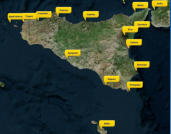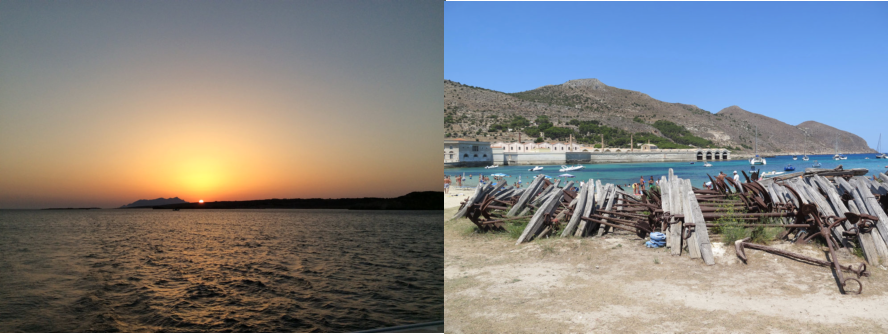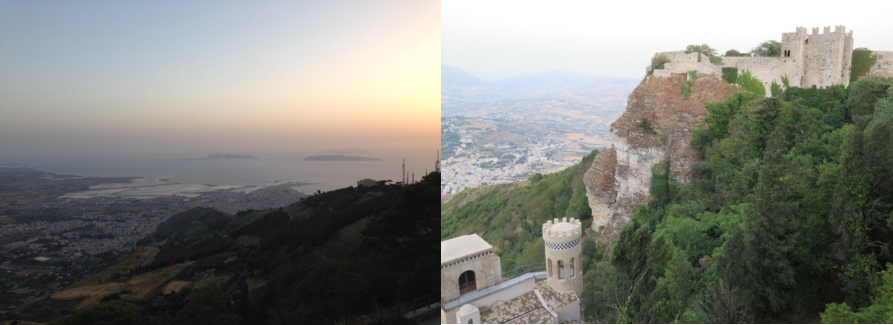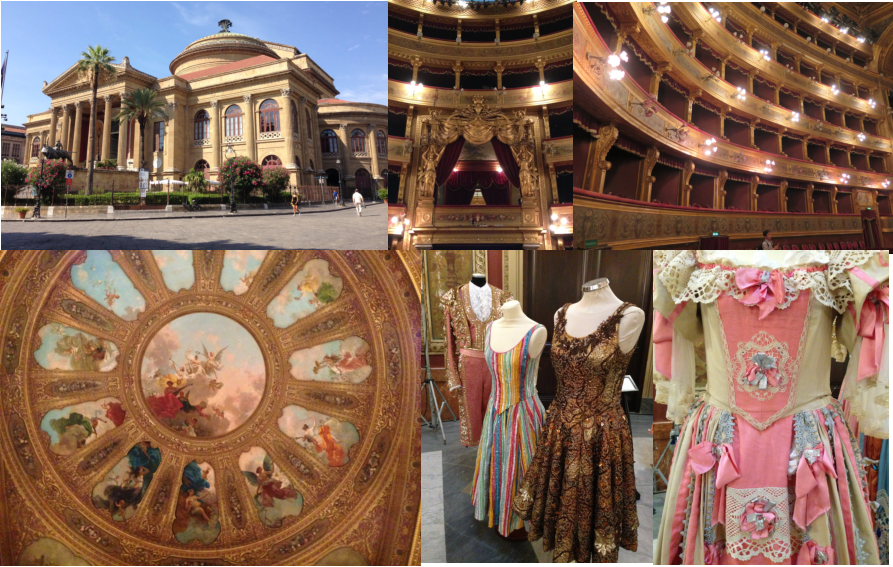



Our Wakes: 2017








North Sicilia: (July & Augustus 2017)

During our stay around Sicilia we travelled quite a bit along its north coast. We went to the west side to the city of Trapani and the Egadine islands (Favignana, Levanzo and Marettimo) as
west side to the city of Trapani and the Egadine islands (Favignana, Levanzo and Marettimo) as well as the east side to Milazzo’s harbor close to the Strait of Messina. On the most Western
well as the east side to Milazzo’s harbor close to the Strait of Messina. On the most Western side of Sicilia is a group of islands called the Egadine islands. They are part of a natural park
side of Sicilia is a group of islands called the Egadine islands. They are part of a natural park
 and to access them you need a permit. Unfortunately, the permit does not cover everything. If
and to access them you need a permit. Unfortunately, the permit does not cover everything. If you want to have a buoy you need another permit and the same is true for scuba diving. Luckily,
you want to have a buoy you need another permit and the same is true for scuba diving. Luckily, the islands are nice and if you visit them you will see that there used to be a big tuna industry
the islands are nice and if you visit them you will see that there used to be a big tuna industry on the islands. Today all the tuna factories have been closed since a long time ago. We were a
on the islands. Today all the tuna factories have been closed since a long time ago. We were a little disappointment with the islands; probably our expectations were too high. Other people
little disappointment with the islands; probably our expectations were too high. Other people like this place very much; it just shows that people’s opinions are not always the same. On the
like this place very much; it just shows that people’s opinions are not always the same. On the westernmost end of the island of Sicily lies the city of Trapani. It is an important harbor with
westernmost end of the island of Sicily lies the city of Trapani. It is an important harbor with an interesting fish market otherwise the city itself has not much to offer. Near the train
an interesting fish market otherwise the city itself has not much to offer. Near the train station, you can take a cable car up to the medieval city of Erice. During the ascent you will
station, you can take a cable car up to the medieval city of Erice. During the ascent you will have a beautiful view of the salt lakes were salt is harvested. Once in Erice you will have a
have a beautiful view of the salt lakes were salt is harvested. Once in Erice you will have a spectacular view of the North and East side of Sicilia.
spectacular view of the North and East side of Sicilia.
 Erice is a very nice town with well-preserved houses that today have been transformed into
Erice is a very nice town with well-preserved houses that today have been transformed into souvenir shops and restaurants. There are no modern buildings in Erice, which makes it a unique
souvenir shops and restaurants. There are no modern buildings in Erice, which makes it a unique village that we recommend visiting. Cruising along the north coast, we reached the city of
village that we recommend visiting. Cruising along the north coast, we reached the city of Castellammare de Golfo. It is a little harbor built in between the hills. The view is quit unique.
Castellammare de Golfo. It is a little harbor built in between the hills. The view is quit unique. Not far from there you can visit the historical site of Segesta. The place has a remarkable
Not far from there you can visit the historical site of Segesta. The place has a remarkable Greek temple as well as a Greek theater. The temple
Greek temple as well as a Greek theater. The temple 
 still has all its columns in place, but what is interesting to note is that its construction was
still has all its columns in place, but what is interesting to note is that its construction was never completed. There is also a theater nearby. If you visit them you will not be
never completed. There is also a theater nearby. If you visit them you will not be disappointed, but do not forget to look also at the landscape. Moving toward the East you will
disappointed, but do not forget to look also at the landscape. Moving toward the East you will arrive at the city of Palermo which is without doubt the major city in the north of Sicily. We
arrive at the city of Palermo which is without doubt the major city in the north of Sicily. We stopped in Palermo several times and visited The Catacombs, the Opera and the Cathedral. The
stopped in Palermo several times and visited The Catacombs, the Opera and the Cathedral. The Maximo Victorrio Emanuelle Theater located in the center of the city was built in 1875 and is
Maximo Victorrio Emanuelle Theater located in the center of the city was built in 1875 and is the biggest opera house in Italy. The Italian King Humberto 1 was quite upset by its
the biggest opera house in Italy. The Italian King Humberto 1 was quite upset by its construction as he had declared that Palermo did not need such a big opera house.
construction as he had declared that Palermo did not need such a big opera house.
 He refused to join the opening ceremony and until today, no Italian king or president, has ever
He refused to join the opening ceremony and until today, no Italian king or president, has ever been to the opera there. Today this opera is the only one in Italy that books a profit as the
been to the opera there. Today this opera is the only one in Italy that books a profit as the prices are democratic and they always play to a full house. It is ranked the third largest opera
prices are democratic and they always play to a full house. It is ranked the third largest opera house in Europe after Vienna and Amsterdam. Emotional people should not enter the catacombs
house in Europe after Vienna and Amsterdam. Emotional people should not enter the catacombs of Palermo. More than 8,000 bodies rest there and despite some treatment, the bodies have
of Palermo. More than 8,000 bodies rest there and despite some treatment, the bodies have decayed. The catacombs started to receive people in around 1600; the last person to be buried
decayed. The catacombs started to receive people in around 1600; the last person to be buried there was in 1920. Taking photographs is not allowed in the catacombs, but on the web many
there was in 1920. Taking photographs is not allowed in the catacombs, but on the web many people have posted a large number of photographs taken there. What disturbed us was that
people have posted a large number of photographs taken there. What disturbed us was that some people visited the catacombs with their dog. The dog did not seem to be impressed
some people visited the catacombs with their dog. The dog did not seem to be impressed
 by all the bones but I still believe this is not a place for dogs. During our stay in Palermo, many
by all the bones but I still believe this is not a place for dogs. During our stay in Palermo, many people informed us that the city was celebrating Santa Rosalia. At the age of 14, the future
people informed us that the city was celebrating Santa Rosalia. At the age of 14, the future Saint decided to leave her parents and hide in the nearby mountains and live as a hermit were
Saint decided to leave her parents and hide in the nearby mountains and live as a hermit were she died in 1166. In 1624, during the plague, the Virgin Mary appeared to a sick women and a
she died in 1166. In 1624, during the plague, the Virgin Mary appeared to a sick women and a hunter and instructed them to collect the remains of the girl. She also pointed out the cave
hunter and instructed them to collect the remains of the girl. She also pointed out the cave where the remains could be found. Since then, St Rosalia has been the patron saint of Palermo
where the remains could be found. Since then, St Rosalia has been the patron saint of Palermo which is celebrated every year. The cathedral devoted to the patron contains a lot of graves
which is celebrated every year. The cathedral devoted to the patron contains a lot of graves of important people. In addition to the relics of St Rosalia you can find the tombs of several
of important people. In addition to the relics of St Rosalia you can find the tombs of several Italian emperors and kings. This shows on its own that Palermo was once a much more
Italian emperors and kings. This shows on its own that Palermo was once a much more important city that it is today. One tomb did puzzle me as it was very modern. It was the tomb
important city that it is today. One tomb did puzzle me as it was very modern. It was the tomb of Saint Pin Puglisi killed by the mafia in 1993. This priest wanted to regain control of the
of Saint Pin Puglisi killed by the mafia in 1993. This priest wanted to regain control of the revenue from the religious celebrations in Palermo. The mafia could not accept this and on his
revenue from the religious celebrations in Palermo. The mafia could not accept this and on his 50th birthday, they killed him. In 2012 he was elevated to sainthood and in 2013
50th birthday, they killed him. In 2012 he was elevated to sainthood and in 2013
 his body was transferred to the cathedral. One interesting place to visit in Palermo is the
his body was transferred to the cathedral. One interesting place to visit in Palermo is the market. In fact there are three markets in Palermo. The markets are not as big as the one in
market. In fact there are three markets in Palermo. The markets are not as big as the one in Catania or Syracuse but you can find all kinds of fruit, fish, meat and vegetables. The Palermo
Catania or Syracuse but you can find all kinds of fruit, fish, meat and vegetables. The Palermo harbor is mainly where ferries transfer trucks and passengers to the island of Sardinia 200
harbor is mainly where ferries transfer trucks and passengers to the island of Sardinia 200 miles (370km) away. Sailing further East from Palermo, we reached the city of Cefalu. This
miles (370km) away. Sailing further East from Palermo, we reached the city of Cefalu. This city is easy to recognize as behind there is a 245 meter high rock. Inside the city you get the
city is easy to recognize as behind there is a 245 meter high rock. Inside the city you get the impression that you are in and old city as cars are blocked from entering and must stay
impression that you are in and old city as cars are blocked from entering and must stay outside. Cefalu is known as a resort. Situated in the middle of the city, the Cathedral is
outside. Cefalu is known as a resort. Situated in the middle of the city, the Cathedral is classified as a world heritage site by UNESCO and is a must to visit. It’s construction started
classified as a world heritage site by UNESCO and is a must to visit. It’s construction started
 in 1131 and it contains some of the most beautiful byzantine mosaics of Italy. They have been
in 1131 and it contains some of the most beautiful byzantine mosaics of Italy. They have been freshly restored and are very beautiful. They represent the Christ and the Virgin Mary. The
freshly restored and are very beautiful. They represent the Christ and the Virgin Mary. The mosaics are very bright as the background consists mostly of gold tiles while the clothes are
mosaics are very bright as the background consists mostly of gold tiles while the clothes are in blue. Sailing even further east we could not resist revisiting the Aeolian Islands. Bad
in blue. Sailing even further east we could not resist revisiting the Aeolian Islands. Bad weather forced us to stay there for a week, but it was not an issue. Once the weather cleared
weather forced us to stay there for a week, but it was not an issue. Once the weather cleared we sailed to Milazzo. This town is important as many tourist boats pick up passengers there for
we sailed to Milazzo. This town is important as many tourist boats pick up passengers there for the Aeolian Islands, but otherwise there is not much to see in this town. After a night’s rest
the Aeolian Islands, but otherwise there is not much to see in this town. After a night’s rest we passed through the Straits of Messina one more time.
we passed through the Straits of Messina one more time.
 west side to the city of Trapani and the Egadine islands (Favignana, Levanzo and Marettimo) as
west side to the city of Trapani and the Egadine islands (Favignana, Levanzo and Marettimo) as well as the east side to Milazzo’s harbor close to the Strait of Messina. On the most Western
well as the east side to Milazzo’s harbor close to the Strait of Messina. On the most Western side of Sicilia is a group of islands called the Egadine islands. They are part of a natural park
side of Sicilia is a group of islands called the Egadine islands. They are part of a natural park
 and to access them you need a permit. Unfortunately, the permit does not cover everything. If
and to access them you need a permit. Unfortunately, the permit does not cover everything. If you want to have a buoy you need another permit and the same is true for scuba diving. Luckily,
you want to have a buoy you need another permit and the same is true for scuba diving. Luckily, the islands are nice and if you visit them you will see that there used to be a big tuna industry
the islands are nice and if you visit them you will see that there used to be a big tuna industry on the islands. Today all the tuna factories have been closed since a long time ago. We were a
on the islands. Today all the tuna factories have been closed since a long time ago. We were a little disappointment with the islands; probably our expectations were too high. Other people
little disappointment with the islands; probably our expectations were too high. Other people like this place very much; it just shows that people’s opinions are not always the same. On the
like this place very much; it just shows that people’s opinions are not always the same. On the westernmost end of the island of Sicily lies the city of Trapani. It is an important harbor with
westernmost end of the island of Sicily lies the city of Trapani. It is an important harbor with an interesting fish market otherwise the city itself has not much to offer. Near the train
an interesting fish market otherwise the city itself has not much to offer. Near the train station, you can take a cable car up to the medieval city of Erice. During the ascent you will
station, you can take a cable car up to the medieval city of Erice. During the ascent you will have a beautiful view of the salt lakes were salt is harvested. Once in Erice you will have a
have a beautiful view of the salt lakes were salt is harvested. Once in Erice you will have a spectacular view of the North and East side of Sicilia.
spectacular view of the North and East side of Sicilia.
 Erice is a very nice town with well-preserved houses that today have been transformed into
Erice is a very nice town with well-preserved houses that today have been transformed into souvenir shops and restaurants. There are no modern buildings in Erice, which makes it a unique
souvenir shops and restaurants. There are no modern buildings in Erice, which makes it a unique village that we recommend visiting. Cruising along the north coast, we reached the city of
village that we recommend visiting. Cruising along the north coast, we reached the city of Castellammare de Golfo. It is a little harbor built in between the hills. The view is quit unique.
Castellammare de Golfo. It is a little harbor built in between the hills. The view is quit unique. Not far from there you can visit the historical site of Segesta. The place has a remarkable
Not far from there you can visit the historical site of Segesta. The place has a remarkable Greek temple as well as a Greek theater. The temple
Greek temple as well as a Greek theater. The temple 
 still has all its columns in place, but what is interesting to note is that its construction was
still has all its columns in place, but what is interesting to note is that its construction was never completed. There is also a theater nearby. If you visit them you will not be
never completed. There is also a theater nearby. If you visit them you will not be disappointed, but do not forget to look also at the landscape. Moving toward the East you will
disappointed, but do not forget to look also at the landscape. Moving toward the East you will arrive at the city of Palermo which is without doubt the major city in the north of Sicily. We
arrive at the city of Palermo which is without doubt the major city in the north of Sicily. We stopped in Palermo several times and visited The Catacombs, the Opera and the Cathedral. The
stopped in Palermo several times and visited The Catacombs, the Opera and the Cathedral. The Maximo Victorrio Emanuelle Theater located in the center of the city was built in 1875 and is
Maximo Victorrio Emanuelle Theater located in the center of the city was built in 1875 and is the biggest opera house in Italy. The Italian King Humberto 1 was quite upset by its
the biggest opera house in Italy. The Italian King Humberto 1 was quite upset by its construction as he had declared that Palermo did not need such a big opera house.
construction as he had declared that Palermo did not need such a big opera house.
 He refused to join the opening ceremony and until today, no Italian king or president, has ever
He refused to join the opening ceremony and until today, no Italian king or president, has ever been to the opera there. Today this opera is the only one in Italy that books a profit as the
been to the opera there. Today this opera is the only one in Italy that books a profit as the prices are democratic and they always play to a full house. It is ranked the third largest opera
prices are democratic and they always play to a full house. It is ranked the third largest opera house in Europe after Vienna and Amsterdam. Emotional people should not enter the catacombs
house in Europe after Vienna and Amsterdam. Emotional people should not enter the catacombs of Palermo. More than 8,000 bodies rest there and despite some treatment, the bodies have
of Palermo. More than 8,000 bodies rest there and despite some treatment, the bodies have decayed. The catacombs started to receive people in around 1600; the last person to be buried
decayed. The catacombs started to receive people in around 1600; the last person to be buried there was in 1920. Taking photographs is not allowed in the catacombs, but on the web many
there was in 1920. Taking photographs is not allowed in the catacombs, but on the web many people have posted a large number of photographs taken there. What disturbed us was that
people have posted a large number of photographs taken there. What disturbed us was that some people visited the catacombs with their dog. The dog did not seem to be impressed
some people visited the catacombs with their dog. The dog did not seem to be impressed
 by all the bones but I still believe this is not a place for dogs. During our stay in Palermo, many
by all the bones but I still believe this is not a place for dogs. During our stay in Palermo, many people informed us that the city was celebrating Santa Rosalia. At the age of 14, the future
people informed us that the city was celebrating Santa Rosalia. At the age of 14, the future Saint decided to leave her parents and hide in the nearby mountains and live as a hermit were
Saint decided to leave her parents and hide in the nearby mountains and live as a hermit were she died in 1166. In 1624, during the plague, the Virgin Mary appeared to a sick women and a
she died in 1166. In 1624, during the plague, the Virgin Mary appeared to a sick women and a hunter and instructed them to collect the remains of the girl. She also pointed out the cave
hunter and instructed them to collect the remains of the girl. She also pointed out the cave where the remains could be found. Since then, St Rosalia has been the patron saint of Palermo
where the remains could be found. Since then, St Rosalia has been the patron saint of Palermo which is celebrated every year. The cathedral devoted to the patron contains a lot of graves
which is celebrated every year. The cathedral devoted to the patron contains a lot of graves of important people. In addition to the relics of St Rosalia you can find the tombs of several
of important people. In addition to the relics of St Rosalia you can find the tombs of several Italian emperors and kings. This shows on its own that Palermo was once a much more
Italian emperors and kings. This shows on its own that Palermo was once a much more important city that it is today. One tomb did puzzle me as it was very modern. It was the tomb
important city that it is today. One tomb did puzzle me as it was very modern. It was the tomb of Saint Pin Puglisi killed by the mafia in 1993. This priest wanted to regain control of the
of Saint Pin Puglisi killed by the mafia in 1993. This priest wanted to regain control of the revenue from the religious celebrations in Palermo. The mafia could not accept this and on his
revenue from the religious celebrations in Palermo. The mafia could not accept this and on his 50th birthday, they killed him. In 2012 he was elevated to sainthood and in 2013
50th birthday, they killed him. In 2012 he was elevated to sainthood and in 2013
 his body was transferred to the cathedral. One interesting place to visit in Palermo is the
his body was transferred to the cathedral. One interesting place to visit in Palermo is the market. In fact there are three markets in Palermo. The markets are not as big as the one in
market. In fact there are three markets in Palermo. The markets are not as big as the one in Catania or Syracuse but you can find all kinds of fruit, fish, meat and vegetables. The Palermo
Catania or Syracuse but you can find all kinds of fruit, fish, meat and vegetables. The Palermo harbor is mainly where ferries transfer trucks and passengers to the island of Sardinia 200
harbor is mainly where ferries transfer trucks and passengers to the island of Sardinia 200 miles (370km) away. Sailing further East from Palermo, we reached the city of Cefalu. This
miles (370km) away. Sailing further East from Palermo, we reached the city of Cefalu. This city is easy to recognize as behind there is a 245 meter high rock. Inside the city you get the
city is easy to recognize as behind there is a 245 meter high rock. Inside the city you get the impression that you are in and old city as cars are blocked from entering and must stay
impression that you are in and old city as cars are blocked from entering and must stay outside. Cefalu is known as a resort. Situated in the middle of the city, the Cathedral is
outside. Cefalu is known as a resort. Situated in the middle of the city, the Cathedral is classified as a world heritage site by UNESCO and is a must to visit. It’s construction started
classified as a world heritage site by UNESCO and is a must to visit. It’s construction started
 in 1131 and it contains some of the most beautiful byzantine mosaics of Italy. They have been
in 1131 and it contains some of the most beautiful byzantine mosaics of Italy. They have been freshly restored and are very beautiful. They represent the Christ and the Virgin Mary. The
freshly restored and are very beautiful. They represent the Christ and the Virgin Mary. The mosaics are very bright as the background consists mostly of gold tiles while the clothes are
mosaics are very bright as the background consists mostly of gold tiles while the clothes are in blue. Sailing even further east we could not resist revisiting the Aeolian Islands. Bad
in blue. Sailing even further east we could not resist revisiting the Aeolian Islands. Bad weather forced us to stay there for a week, but it was not an issue. Once the weather cleared
weather forced us to stay there for a week, but it was not an issue. Once the weather cleared we sailed to Milazzo. This town is important as many tourist boats pick up passengers there for
we sailed to Milazzo. This town is important as many tourist boats pick up passengers there for the Aeolian Islands, but otherwise there is not much to see in this town. After a night’s rest
the Aeolian Islands, but otherwise there is not much to see in this town. After a night’s rest we passed through the Straits of Messina one more time.
we passed through the Straits of Messina one more time.



































